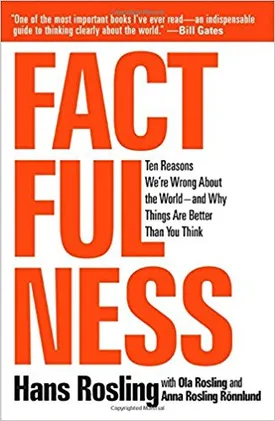Ola Rosling
Ola Rosling is an author, data scientist, and speaker who has spent the past decade exploring the fascinating world of data visualisation. In his best-selling book, "Factfulness: Ten Reasons We're Wrong About the World - and Why Things Are Better Than You Think", Rosling utilises personal anecdotes and accessible data analysis to challenge our commonly held assumptions about the world and provide readers with an empowering and optimistic perspective on the future.
Born in 1966 in Sweden, Ola Rosling grew up in a family of dedicated teachers and avid readers. He was instilled with a passion for data and analysis, something he described as coming "from being surrounded by all those Swedish teachers who loved teaching in a numbers-based way." After his undergraduate studies, Rosling found himself working at a policy research firm where he quickly realised he was “employed to do the impossible”, routinely assigned the unenviable task of helping local Swedish governments understand the vast and complex data sets they had collected.
Rosling quickly developed unique approaches to making the data understandable and applicable, experiments he would later expand on, together with his wife Anna, to found the non-profit Gapminder Foundation, which educates and promotes the “informed worldview” according to data. In words of the Roslings, "Gapminder works to mobilize fact-based worldviews on global developments." Through this foundation and later in his book, Rosling uses data visualisation to illustrate the various ways the world is becoming a better place, something he believes is not being adequately realised or understood by the public.
In “Factfulness”, Rosling debunks the notion that people, in rich or poor countries alike, are distressed or pessimistic about the state of the world, something he and Anna have come to refer to as “The Negativity Instinct”. In the book, Rosling takes readers on an optimistic journey, demonstrating that the world is improving across all aspects – like global health, human rights, and literacy. In other words, Rosling encourages everyone to “zoom out” from their immediate environment to understand how things are moving in the right direction across the globe.
Rosling believes progress is happening all around us and that the world is, in fact, becoming more successful – contrary to the notion of constant decline and struggle common in popular culture and media. He further goes on to discuss ten key insights concerning global development, which through anecdotes and data, explains why we find it hard to think and act factfully without letting the negativity instinct take over.
To achieve a greater level of “factfulness”, Rosling goes beyond the data, advocating for data-based evidence when making decisions and thus avoiding falling back on the instinctive “but that's the way it's been” attitude. He also calls for citizens to stop worrying and start doing, recommending changing our mindset and instead of focusing on the doom and gloom, concentrating on “positive, durable, and meaningful steps” to make ourselves, our countries, and our world a better place.
In recent years, Rosling has used his expanding platform to continue his mission to promote a fact-based worldview, appearing at The TED conference multiple times and taking part in multiple podcasts, such as Freakonomics Radio, discussing the same topics covered in “Factfulness”. In his own words, Rosling says “the truth is much more optimistic than most people think it is, and there’s a lot of potential for us to make the world even better”. His book, and his works in general, encourage readers to do just that: view the world from a different perspective and make progress without compromising the facts.

